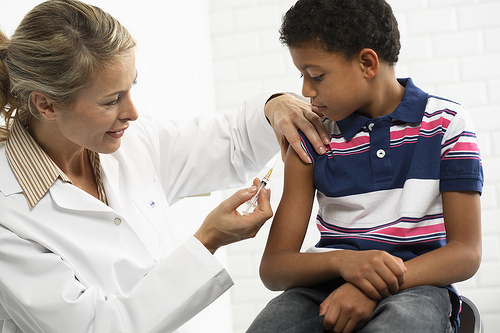
What Is Vaccine/Immunization?
Immunization is a preventive measure that uses either attenuated or live vaccines. It works to develop the person’s resistance against infections. There are two types of immunization. These include passive and active forms. People can receive protection against numerous pathogens with the help of vaccination and immunization. These pathogens are the causative agents that can cause diseases. Most health institutions such as hospitals and community clinics provide immunizations that include both the initial and booster doses. Their vision is to safeguard people from the threat of health diseases. There are innovative vaccines that prevent life-threatening health problems from happening. These vaccines are capable of completely destroying the pathogen’s DNA. This prevents the disease from spreading throughout the body.
- Important notification about information and brand names used in this slideshow!
- Photo courtesy of Sanofi Pasteur by Flickr : www.flickr.com/photos/sanofi-pasteur/5282908539/
- www.cdc.gov/vaccines/vac-gen/why.htm
- http://www.immunizeforgood.com/why-vaccinate
- http://www.immunizeforgood.com/fact-or-fiction/benefits-vs.-risks
- http://www.niaid.nih.gov/topics/vaccines/understanding/pages/vaccinebenefits.aspx
- http://www.justmommies.com/family-life/family-health/the-vaccination-debate-pros-and-cons-vaccinations

How Do Vaccines Work?
Vaccines contain live, weakened, or attenuated strains of the pathogen. When the vaccine is introduced into the body’s system, the body adapts a resistance level to counteract the destructive effect of these causative agents. The weakened viruses allow the immune system to produce specific immunoglobulins against specific diseases. These naturally-occurring secretions work to protect the body from the entire course of the disease. As the body fully adapts to these attenuated pathogens, it creates a medium that will protect the body from future infections. The vaccination remarkably reduces the chance of developing the disease.
- Important notification about information and brand names used in this slideshow!
- Photo courtesy of Novartis AG by Flickr : www.flickr.com/photos/51868421@N04/5277695536/

Some Common Vaccine-Preventable Diseases
The World Health Organization (WHO) recommends that every health institution provides free immunization shots for both children and adults. This health program is designed to reduce the morbidity and mortality cases of communicable diseases. Some vaccines that are commonly given to prevent diseases include DTP (Diphtheria, Tetanus Toxoid, and Pertussis vaccine), BCG (Bacillus Calmette-Guerin vaccine), Hepatitis B vaccine, Influenza vaccine, Cholera vaccine, and MMR (Measles, Mumps, and Rubella vaccine). Newer vaccines that are currently undergoing final testing include “Dengue” and “Hemorrhagic Fever” Vaccine. There are some vaccines that can reduce the risk of getting cervical cancer.
- Important notification about information and brand names used in this slideshow!
- Photo courtesy of Sanofi Pasteur by Flickr : www.flickr.com/photos/sanofi-pasteur/5282906611/
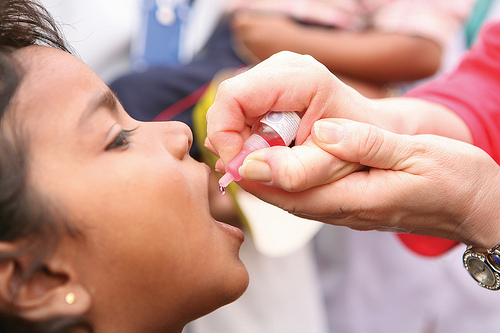
Why Do We Immunize Our Children?
The immune system of children is not fully developed. This is particularly true in those who are under the age of four. The immaturity of the organs of their bodies makes them more vulnerable to any contagious or infectious diseases than adults. The reason why it is recommended that children receive their doses of scheduled vaccines is to prevent them from getting serious diseases that can jeopardize their lives. Vaccinations are mandatory in many countries, to cut down the death toll from these diseases. As early as a few days old, newborns are given immunizations that can safeguard them from communicable diseases such as pulmonary tuberculosis. Booster doses are given throughout childhood.
- Important notification about information and brand names used in this slideshow!
- Photo courtesy of RIBI Image Library by Flickr : www.flickr.com/photos/91311153@N02/8290593345/

Diseases Are Becoming Rare Due To Vaccinations
The recent epidemiological reports made by World Health Organization and US Center for Disease Control and Prevention show that there is a drastic reduction of morbidity and mortality cases related to communicable diseases. They are developing newer vaccines to eliminate the common reactions and possible side effects that are common in previous immunization shots. Most pharmaceutical manufacturers are skeptic in generating newer generations of vaccines that would provide lifetime protection from diseases. Some countries are declared “free” from certain specific endemic diseases. Vaccines create an advantage for people by getting rid of life-threatening diseases. The efficiency rate of these immunizations is higher especially when initial and follow-up doses are given.
- Important notification about information and brand names used in this slideshow!
- Photo courtesy of Giles Turnbull by Flickr : www.flickr.com/photos/gilest/77733786/

Why Do Parents Object To Vaccines?
Although they are rare, allergic reactions to vaccines can be fatal. These reactions can occur especially if there is no emergency treatment given to people suffering from severe allergic reactions. If not treated immediately, it can cause death. Anaphylactic shock is a condition characterized by fatal allergic responses right after exposure to the substance the person is allergic to. This condition can happen to anyone. It applies to any forms of substances which includes vaccines. Parents who have very little knowledge about immunization may disagree with vaccination for their children.
- Important notification about information and brand names used in this slideshow!
- Photo courtesy of alenka_getman by Flickr : www.flickr.com/photos/8255045@N03/8815785356/

Do Vaccines Pose Health Risks?
There are no serious adverse reactions or side effects related to vaccine except for anaphylactic shock. Most people who received immunization shots may suffer from minimal side effects. The side effects of vaccines include inflammation on the injection site (if injectable vaccine is used), low-grade fever which is a normal reaction of the immune system, and muscle weakness can be caused by vaccines that can numb the injection site, which may lead to lethargy. These side effects are temporary and it will not last for more than a few days. If these symptoms have lasted for several days to several weeks, consult your physician for further medical evaluation.
- Important notification about information and brand names used in this slideshow!
- Photo courtesy of Sanofi Pasteur by Flickr : www.flickr.com/photos/sanofi-pasteur/5283533286/

Risks Of Not Vaccinating
If a person did not receive any immunization shots, he will have higher chances of developing diseases than those who are immunized according to the WHO guidelines. The rate of getting the disease is reduced by 50% during the initial dose, 70% for the follow-up dose, and 100% for the booster dose. The pattern of receiving doses is based on the epidemiological studies made by the US CDC and the WHO. The probability rate of being free from these diseases is far greater once a person has completed the entire round of immunization shots. Other one-shot vaccines are designed to provide temporary immunity to people going in high-risk areas. These vaccines are usually in oral form.
- Important notification about information and brand names used in this slideshow!
- Photo courtesy of Marty Hergert by Flickr : www.flickr.com/photos/dmhergert/756848148/

Some Children Cannot Be Vaccinated
There are issues concerning the effectiveness of vaccines in children who are under two years old. Some clinical experts believe that giving a vaccine to children within this age bracket may have less of a chance to develop a healthy immune system altogether. The immaturity of a child’s immune system can’t create a proper resistance level to weakened pathogens. Some claim that giving these immunizations as early as two years old can affect the efficiency rate of other vaccine shots in the future. This is not only true for the vaccines that are currently being given to the child, but it can also have an effect on the potency of the immunizations that the child will receive in the future.
- Important notification about information and brand names used in this slideshow!
- Photo courtesy of Scott Robinson by Flickr : www.flickr.com/photos/clearlyambiguous/22950892/
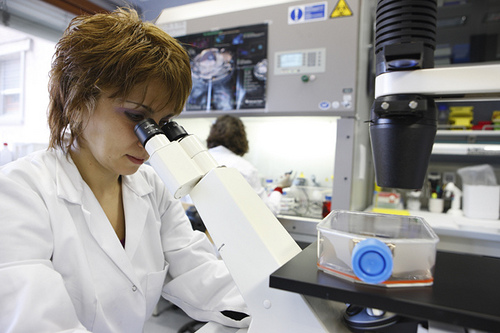
We Vaccinate To Protect Our Future
As time passes, new strains of these diseases are popping up all over the world. These place more people at risk every day. Fortunately, there are many vaccines that can eliminate the chance of getting these disease. Being vaccinated does not only secure your health but it also secures your future from the threat of the life-threatening pathogens that exist. Women who received complete immunizations can provide passive antibodies to their babies. This allows them to protect their babies against the opportunistic causative agents. Getting immunizations can establish a better and healthy life. Therefore, it is important to get these treatments to remain healthy.
- Important notification about information and brand names used in this slideshow!
- Photo courtesy of Novartis AG by Flickr : www.flickr.com/photos/51868421@N04/5277718708/



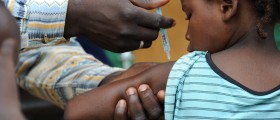


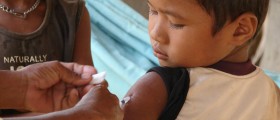

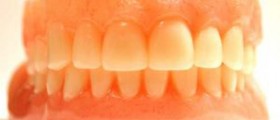






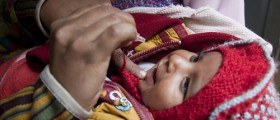

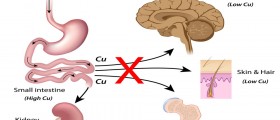




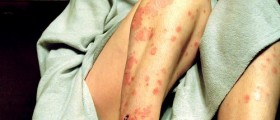




Your thoughts on this
Loading...